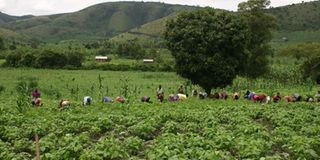Two methods, same approach: Creating vital linkages for farmers

A group of farmers tending their gardens. Connecting farmers to other players in the value chain such as traders, input dealers and extentionists is vital to enable them become more productive and thus improving their livelihood. FILE PHOTO
The farmer may have their garden but this will not guarantee them the maximum yields as projected. Many rural farmers put in time and hard work but have not appreciated book-keeping, and are not exposed to linkages which is a good necessity of realising better returns on their farmland investment.
Two companies are using methods to link farmers to suppliers of good quality seed, agronomists, markets and other useful linkages.
One is an application called Farmforce, an integrated mobile platform to manage smallholder farming. The other is called Ezy-Agric; an Akorion software-based ecosystem under which the company connects farmers, producers, buyers, sellers, input suppliers, exporters, soil laboratories and crop insurance.
Akorion is an Ateso word for “farmer”, which was adopted by five youth-led Information and Communications Technology (ICT) companies whose goal is to empower livelihoods of smallholder farmers.
Farmforce, on the other hand, is used by Amatheon Agri Uganda, which is part of a global brand. It is located in Nwoya, northern Uganda, engaging farmers in a bottom-up approach in regards to acquiring farmland.
Patrick Okwera is one of Akorion’s Village Agents (VAs) in Pato, near Gulu, in Northern Uganda. His job entails digitally profiling farmers. He uses a smart phone, which was advanced to him by Akorion.
At the time of this interview, he was getting information from Abel Mwaka, a farmer in Bobi Sub-county, in Pato.
Compliance
When profiling a farmer, he captures the following: name, location which he can ascertain using Global Positioning System (GPS), crop types, land size and production. For each farmer that he profiles, he earns some money.
According to Harriet Laker, a private sector advisor on gender, youth and climate change under the Usaid Feed the Future programme, there are 350 VAs registered under Akorion.
Collin Oryem, a monitoring and evaluation officer at Amatheon Agri, explains that most rural smallholder operations still use pen-and-paper methods to record their activities.
In many markets, compliance regulations and sustainability standards demand that a wide range of highly detailed information about planting, harvesting and growing activities.
Although some try, in reality, it is almost impossible to transform paper-based information into suitably compliant data that meet these strict new demands.
“Paper-based processes are time-consuming, difficult to aggregate, inconsistent, processing delays and there is difficulty in satisfying traceability demands for export markets. The result is that the crops of smallholder farmers cannot be exported to these markets,” Oryem argues.
Traditional pen-and-paper processes therefore limit export options of smallholders because it is almost impossible to use paper-based information to meet the strict demands of today’s compliance regulations and sustainability standards.
Interconnect
And that is where Farmforce comes in, to let the farmer make a clean sweep of paper-based methods and processes.
Farmforce is a cloud-based software platform which can manage the activities of a group of many smallholder farms and farmers ensure compliance, and establish traceability.
Farmforce works on all Android smartphones and tablets, and on any computer with a web browser. Ezy-Agric, on the other hand, acts as a virtual trading centre that interconnects trained VAs at village level with farmers. Each farmer serves an average of 150 farmers.
Therefore, Ezy-Agric brings information and bundled services nearer to smallholder farmers in Uganda.
Through this, Akorion has equipped each VA with a smartphone which they use to collect farmers’ records. The data is then uploaded onto Ezy-Agric platform.
More productive
In addition, these agents also provide extension services to farmers on topics such as better agronomic practices, soil testing, weather forecasts, market prices, digital financial services such as savings, transactions and credit and crop insurance.
The ICT platform also acts as a virtual trading centre with electronic networks connecting producers, buyers, sellers, input suppliers, exporters, crop insurance and financial institutions with Akorion as managers of the data.
Like Farmforce, Akorion provides services to enable farmers to become profitable. At the same time, it engages youth in productive and paying jobs in agriculture. The ratio of extension workers to farmers is currently at 1:50,000 but through the use of technology, Akorion has reduced that ratio to 1:500.
[email protected]




